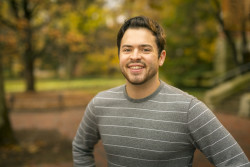
Moving a mile and a half of PVC pipe along unpaved, winding roads in a small pickup truck in a foreign country is no easy task.
Ryan Sullivan, an Arts and Science senior known as “Sully” to his professors, friends and family, knows this firsthand. Doing so was a necessary means to bringing about the first sustainable water source to the Karen tribe in Mae Hong Son, a mountainous region in Thailand.
Sully is the founder of Village to Village, a nongovernmental organization (NGO) dedicated to improving public health, education and homelessness issues in rural Thailand. He wanted to make a difference in the lives of the communities he was serving but in a way that was sustainable and also distinctive to each of those communities.
“We work with and rely on local volunteers and contractors from start to finish on our projects,” Sully explains. [lquote]“It’s important to give the communities we partner with autonomy and make sure the projects we create have the most positive impact possible.”[/lquote]
Sully started Village to Village while he was in high school. Desiring to change the way aid is provided through NGOs to Southeast Asian communities, he took a path less traveled than the typical NGO: He built his nonprofit to have a 100 percent guarantee of no overhead.
Sully is a major in public policy studies, an interdisciplinary major he credits with helping him better understand and tackle the challenges facing the region.
“One of the reasons I chose to come to Vanderbilt is its broad interdisciplinary liberal arts education,” he says. “I am definitely more data oriented now. The classes I’ve taken solidified my thoughts surrounding the international aid community.”
During the past six years, Sully and his team at Village to Village have completed multiple projects including providing rain gear for children during monsoon season; building homes and sanitation projects; and, this past summer, building a school.
While building the school, Sully engaged in negotiations with the Thai government to ensure the school’s sustainability once it was finished. Village to Village paid for the first six months’ worth of operating costs, including teacher training and salaries, and provided the young children’s meals, nutritious food and milk, which they would have gone without were it not for the school. In December the school will become sustainable through the Thai government.
“We are looking to create as big an impact as possible, for as many people as possible,” Sully says. [rquote]”It is an incomparable feeling to get updates and pictures from the villages we’ve helped. It’s what makes it worthwhile and keeps me enthusiastic to keep going.”[/rquote]
Sully is completing his senior capstone project by conducting research within Thai refugee camps and assessing whether refugees are participating in vocational programs and why.
After graduation Sully’s plans include possibly joining the Peace Corps to gain field experience.
Contact: Alexandra Valnoski, communications coordinator, Arts and Science Dean’s Office
(615) 343-1367